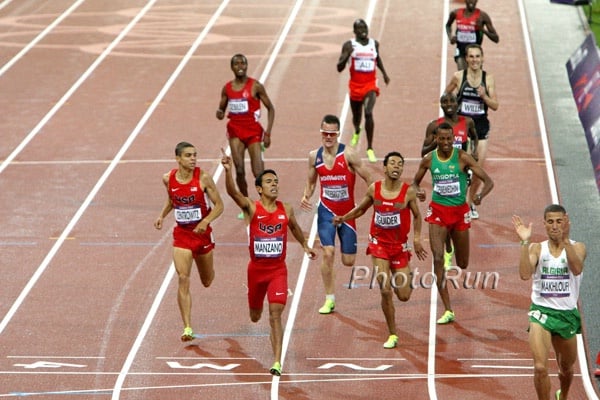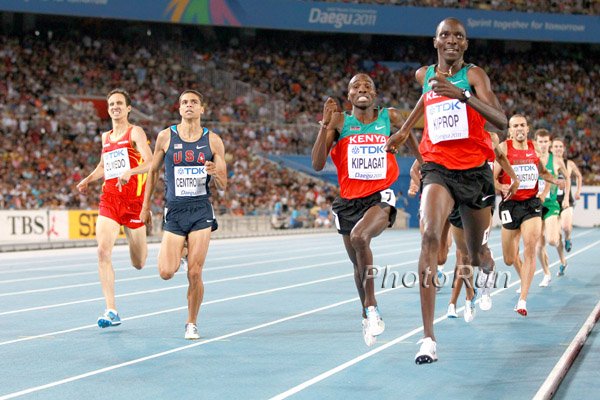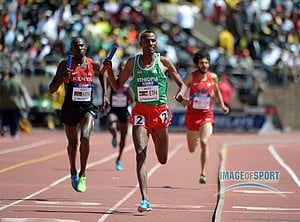Men’s 1,500 Preview: Kenyans Asbel Kiprop And Silas Kiplagat Look To Make Up For Last Year As Americans Leo Manzano And Matt Centrowitz Look For Their Second Medals
Will One Of The Four Kenyans Rabbit The Final?
by LetsRun.com
August 5, 2013
The men’s 1,500 at the 2012 Olympics turned conventional wisdom on its head. Three Kenyans, defending champion Asbel Kiprop, Silas Kiplagat and Nixon Chepseba, went into London in fine form, with the three fastest times on the year, and none of them finished in the top half of the race. Meanwhile, American Leo Manzano, who was dead last in his last Diamond League race prior to the Olympics, left London with a silver medal wrapped around his neck – America’s first medal in the event at the Olympics in 44 years.
Manzano and fellow American teammate Matt Centrowitz, who snagged bronze at the last Worlds in 2011 and was fourth last year, will be hoping that history repeats itself at the 2013 IAAF World Outdoor Track and Field Championships in Moscow, as both have been struggling recently. The Kenyans, on the other hand, who head into London Moscow in fine form, certainly don’t want last year’s nightmare to replay itself.
Lots To Prove For Kenya
Last year in the Olympic final, the injured Kiprop was last, Chepseba was next-to-last and Kiplagat was seventh. All three of those men are back this year with a whole lot to prove. And with Kiprop being the defending champion, Kenya also has a fourth person in the field, Bethwell Birgen. Birgen must know the right people, as he is lucky to be in Moscow since he was just 5th at the Kenyan Trials and has lost to former World Junior champ Caleb Ndiku (who was fourth at the Trials) in two straight races this year, but if you want an indication as to how good the Kenyans are, realize that Birgen has run 3:29.50 3:30.77 this year.
Guess what the fastest anyone not from Kenya has run this year for 1,500? Turkey’s İlham Tanui Özbilen has run 3:31.30 (and he was actually born in Kenya).
So the argument can be made that the fourth guy who scraped onto the Kenyan team is as good as anyone else in the world. As a result, it should be clear that the Kenyans are very, very good and very, very motivated.
Will they be able to make up for last year’s debacle? We most definitely think they will. A sweep of the all three medals is a possibility. It’s never been done at the World Championships and only once been done to the Olympics – way back in 1904. We hope we aren’t offending any relatives of those 1904 team members from the US who went 1-2-3 but the level of competition was far from deep back then.
Kiprop And Kiplagat Lead The Kenyan Charge
Leading the Kenyan charge are Asbel Kiprop and Silas Kiplagat. These guys went 1-2 at the 2011 Worlds, which was the first time in Worlds history that two people from the same country medalled in the 1,500 at the same Worlds.
Kiprop won the Olympics in 2008 at age 19, he is the defending champion and he just ran a 3:27.72 in his last race in Monaco – the fastest time recorded in 9 years. He is still only 24 and entering his prime. It’s hard to not like him.
However, 23-year-old Silas Kiplagat is very, very good and the only guy on the planet who we think is capable of beating Kiprop when Kiprop is at his absolute best, considering that Olympic champion Taoufik Makhloufi is out with an injury.
Kiplagat actually leads the head-to- head series with Kiprop at 1,500/800 (12 to 8) but this year, it’s two wins apiece for each of them (although we’re not sure Kiprop went all-out at the Kenyan Trials, which he lost). If you look at how many race victories they each have in their 20 head-to-head matchups, it’s seven wins apiece. So a pretty even matchup on paper but given the fact that Kiprop is an Olympic and World champion, the edge goes to Kiprop for us.
Plus Kiprop has run 3:27.73 this year. We’re not sure how fast Kiplagat is currently as the Kenyans forbid him from running the London DL meet after the Kenyan Trials. But considering he ran a 3:49.48 mile on June 1st to win in Eugene over Kiprop, we imagine Kiplagat is plenty fast.
Now just because Kiplagat is the only guy we think that can beat Kiprop doesn’t mean that non-Kenyans have no shot at gold. Two things can happen.
The Kenyans can beat themselves. Kiprop himself has run some tactically horrible races in the past that have cost him and of course he was injured last year in London, which cost him dearly.
Winning a rabbitted Diamond League meet is something we know the Kenyans do very well. But controlling a slow and tactical 1,500 is a completely different ball game. If a 1,500 goes out slow, it can turn into a bit of a crap shoot at the international level, particularly on the men’s side, which is full of amazing depth (20 men this year have run under 3:53 in the mile, for example).
Here’s our belief. If the opening 800 is 1:55 or faster, a Kenyan man will win. If it’s slower, a Kenyan man may win but we aren’t guaranteeing it. US fans, we’ll get to you in a minute, but you want to see 1:58 or even 2:00 or higher. The slower the better for the Americans.
Now the Kenyans haven’t been employing any team tactics in recent years. Last year, three Kenyans were in the final, including an injured Kiprop, but no one did anything to help any of their teammates out. That may change this year, as the Kenyans have already had a meeting prior to their Trials to talk about Worlds and at their Trials, the top entrants went across the line sort of celebrating together. The Kenyans have four entrants in the 1,500 so if all four make the final, they already know one of them isn’t medalling, which increases the odds exponentially that one of them will set the pace for the others.
Memo to Kenyan team coach: If you get four, or even three guys in the final, have one of them watch this video and imitate it and we promise you the gold will going back to Kenya.
Memo #2 to Kenyan coach: For the record, we are urging you to imitate the pacing, not all of the EPO use by a slew of guys in that final.
LetsRun.com fans, we hope you take a mid-day break and watch that video as it’s fun to watch. In preparing this writeup, we saw that the World Championship 1,500 record was 3:27, and we said to ourselves, “WTF, how did someone run 3:27 at Worlds? Did someone rabbit the race?”
OK, we’ll pause this preview for a minute and have our first ever mid-article quick take.
Quick Take #1:We talked about this last month (search for Jim Ryun). Since Jim Ryun lost a rabbitted 1,500 at the 1968 Olympics, people have been debating whether it’s violating the spirit of the Games to rabbit a World or Olympic final. We’re not the moral police here, we’re just telling the Kenyans what to do.
The above video is great as during the course of it, you see commentator Steve Cram, a former 1,500 World Record holder, show all sorts of emotions while the race is going on. On the second lap, he’s a bit disappointed by the pacemaker but by the end, he is full of great praise for Hicham El Guerrouj. His commentating was brilliant and something we’d never get from the American duds (Larry Rawson would probably have spent the first 1,200 describing to Americans what a pacemaker was/is, and of course estimating the pace based on leg turnover):
Cram At The Beginning Of The Race:
“From a personal point of view, I’m slightly disappointed that El Guerrouj feels as if he has to have a pacemaker, as let’s face it, that’s what this young Moroccan is. El Guerrouj I think is good enough to win this race at whatever pace it’s run at and whatever point he kicks. It would be close. … Remembering what happened to him in Atlanta when he fell when the pace was slow, remembering that he has been outkicked once or twice when there haven’t been pacemakers, and that slight chink in his armor is something that he doesn’t want anyone else to see.”
Cram At The End Of The Race:
“He’s the defending World Champion, he’s the World record holder over 1,500 meters, he’s the world record holder over the mile. He’s come away here to win the World Championships with a brilliant piece of 1,500-meter running.”
OK, back to our preview.
We expect someone from Kenya to set the pace and we fully expect someone from Kenya to win gold and probably silver as well. A repeat 1-2 by Kiprop-Kiplagat is very much something we expect to see.
Who Else Is A Medal Contender?
Even if Kiprop and Kiplagat go 1-2, there are a slew of guys who could get a bronze. We’ll break down our medal contenders into two categories.
Those that could get gold and those that can’t.
Medal Contenders Who we Could Fathom Winning the Race
1) Ayanleh Souleiman – Djibouti (3:30.31 last year, 3:32.55 this year) – The 20-year-old from Djibouti is a big-time talent. He’s run 1:43 for 800 this year and won 1,500/miles in Oslo and Paris, and 2nd in London in 3:50.07 for the mile.
2) Zakaria Maazouzi – Morocco (3:31.94 PR and SB) – If the 28-year-old from Morocco wins, many people will be thinking “Rashid Ramzi.” Ramzi’s drop from 3:39.30 to 3:30.25 in 2004 seemed almost too good to be true and his ridiculous 1,500/800 double at 2005 Worlds clearly didn’t pass the eyeball test. He didn’t test positive until 2008, however.
Please understand, we aren’t saying that Maazouzi is on drugs. But he’s dropped his previous PR of 3:38.77, which was run in 2007, to 3:31.94 this year and has run in only small meets, no Diamond Leagues. If he’s suddenly a world beater, we are going to be VERY skeptical.
Medal Contenders Who We Can’t Really Fathom Winning The Race
1) İlham Tanui Özbilen – Turkey (3:31.30 PR this year) – The 23-year-old National record holder from Turkey was 8th in the Olympics last year and just PRed in Monaco in his last race. Running 3:31.30 is the good news. The bad news is he lost to three Kenyans in that race (plus Mo Farah).
2) Aman Wote – Ethiopia (3:32.65 1,500 PR this year) – The 29-year-old has been having a big year as he started the year with a 3:35.38 PR. He was third at Prefontaine in the mile (3:49.88), won in Birmingham and was second in Paris.
3) Leo Manzano – USA (3:33.14 SB, 3:32 .7 PR) Manzano is back at Worlds a year after winning the Olympic silver medal. That’s very exciting for US fans – it’s a shame that some shoe company doesn’t feel the same way, as Manzano is still sponsorless. Unbelievable.
In Paris, Manzano ran 3:33.15, which was the second-best time of his career. That’s the good news. The bad news is he proceeded to finish last in Monaco after that. However, Manzano has been consistently inconsistent in his career, so that Monaco race doesn’t scare us off of him at all. Remember, last year, Manzano was last in his final race before the Olympics and that turned out really well for him.
Manzano has a ferocious kick and is great in tactical races, but we don’t think Manzano is going to medal again because we don’t think this final in Moscow will be tactical given the fact there might be four Kenyans in it.
4) Matt Centrowitz – USA (3:33.58 SB, 3:31.96 PR) – Centrowitz was third in 2011 and 4th in 2012. The guy is tactically savvy and great at putting himself in the perfect position. If Kiprop had Centrowitz’s racing savviness, he’d almost never lose.
However, we think Centrowitz is facing a huge uphill battle in 2013. Why? Because in his last three races since winning USAs, he’s dropped out of a 1,500 in Paris, finished 8th in the Monaco 1,500 and then third-to-last in the London mile.
Unlike Manzano, Centrowitz has been very steady over the years, so his struggles of late have us worried in a big way.
LRC Prediction: 1) Kiprop-Kiplagat one-two just like in 2011. No American medal.
Quick Take #2 (remember #1 was up top): There are some other guys who could get bronze, one of whom isn’t the third American Lopez Lomong. Lomong was just 10th in Paris after USAs.
There’s no shame, though, in saying that we think America’s streak of medals in the men’s 1,500 ends after two straight years. Prior to 2011, the US had waited 28 years for an American who hadn’t already won a medal for another country before switching allegiances (Bernard Lagat) to medal.
QT #3: Please note, if the race is tactical, it doesn’t mean that Kiprop and Kiplagat still don’t go 1-2. They went 1-2 in a tactical final two years ago by closing in 1:49 as the winning time in Daegu in 2011 was slower than in London in 2012.
So they can do well in a tactical race, it’s just less of a sure thing.
Up top, Cram talked about the “slight chink” in El Guerrou’s armo being the fact he was outkicked a couple of times. To us, that’s the beauty of the 1500. It’s the nature of the event – everyone in the world has that “slight chink” if it’s truly tactical. One can misjudge their kick, go too early, get caught in traffic, etc.
QT #4: We can’t believe we almost forgot longtime LetsRun reader Nick Willis. The 2008 Olympic silver medallist was a bit easy to forget as he’s been away from the circuit on paternity leave. The paternity leave came at the perfect time as he also picked up an injury.
He comes in with no pressure and that can be a very dangerous thing. He’ll be racing himself into shape and certainly be on the upswing. Stranger things have happened them him sneaking a medal. He just ran a 3:56 mile in Michigan, so we know he’s at least in decent shape.
More from the LRC Vault: 2012 Olympic Track & Field Men’s 1,500 Final: Taoufik Makhloufi Dominates As Leo Manzano Surprises With Silver
*2011: Men’s 1,500m: Matt Centrowitz Gets Bronze As Asbel Kiprop And Silas Kiplagat Get Gold And Silver In Daegu




